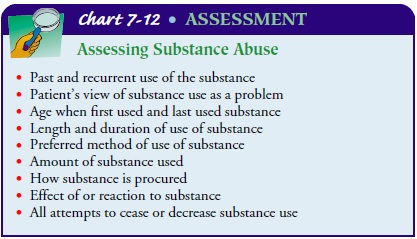Chapter: Medical Surgical Nursing: Individual and Family Considerations Related to Illness
Substance Abuse
Substance Abuse
Some people use
mood-altering substances in an attempt to cope with life’s challenges. A person
who abuses substances has an inability to make healthy decisions and to solve
problems ef-fectively. Typically, people who abuse substances are unable to
identify and implement adaptive behaviors and use illegally ob-tained drugs,
prescribed or over-the-counter medications, and alcohol alone or in combination
with other drugs in an inef-fective attempt to cope with the pressures,
strains, and burdens of life. Over time, physiologic, emotional, cognitive, and
be-havioral problems develop as a result of continuous substance use. These
problems cause distress for the individual, the family, and the community. Some
people may respond to personal ill-ness or the illness of a loved one by using
substances to decrease emotional pain
NURSING IMPLICATIONS
Substance abuse is encountered in all clinical settings.
Intoxica-tion and withdrawal are two common substance abuse problems. Often,
the nurse sees patients who have experienced trauma as a result of inebriation.
Other patients who are active substance abusers enter the primary care setting
with a diagnosis other than that of substance abuse. Many do not disclose the
extent of their substance use. The patient’s use of denial or lack of knowledge
about the devastating effects of psychoactive substances can be detected by the
nurse who performs a substance use assessment (Chart 7-12). In addition, the
nurse can incorporate tools into the assessment that enable drug use to be
detected. Examples of such instruments are the CAGE Questionnaire (Ewing,
1984), the Michigan Alcohol Screening Test (Selzer, 1971), and the Addic-tion
Severity Index (McLellan, Kushner, Metzger, & Peters, 1992).

Health professionals are
in pivotal positions for identifying a substance abuse problem, instituting
treatment protocols, and making follow-up referrals. Because substance abuse
severely af-fects the family, the nurse helps the family members confront the
situation, decrease their enabling behaviors, and motivate the per-son to
obtain treatment.
Caring for codependent
family members is another nursing priority. A codependent person tends to
manifest unhealthy patterns in relationships with others. Codependents struggle
with a need to be needed, an urge to control others, and a will-ingness to
remain involved and suffer with a person who has a drug problem.
The family may approach
the health care team to help set lim-its on the dysfunctional behavior of a
person who abuses sub-stances. At these times, a therapeutic intervention is
organized for the purpose of confronting the patient about substance use and
the need to obtain drug or alcohol treatment. The nurse or other knowledgeable
addiction counselor helps the family present the addicted person with a
realistic perspective about the problem, their concerns about and caring for
the person, and a specific plan for treatment. This therapeutic intervention
works on the premise that honest and caring confrontation can break through the
person’s denial of the addiction. If the person refuses to par-ticipate in the
designed plan, the family members define the con-sequences and state their
commitment to follow through with them. This intervention is empowering to the
family and usually provides the structure needed to secure treatment.
Even with treatment, however, patients may experience re-lapse. Nurses work with patients and their families to prevent re-lapse and to be prepared if relapse occurs. Relapse is considered a part of the illness process and therefore must be viewed and ad-dressed in the same way that chronic illness is treated.
The nurse who is working
with a patient and family struggling with an addiction must dispel the myth
that addiction is a defect in character or a moral fault. Views on substance
abuse vary within our society. A person’s background may help determine whether
he or she uses drugs, what drugs are used, and when they are used (Copel,
2000). The combination of variables, such as values and beliefs, family and
personal norms, spiritual convictions, and con-ditions of the current social
environment, predisposes a person to the possibility of drug use, motivation
for treatment, and contin-ual recovery (Copel, 2000). It has also been said
that a person’s at-titude, especially toward alcohol, reflects the overall
beliefs and attitudes of that individual’s culture (Giger & Davidhizer,
1999).
Related Topics